“Verb voice”, one of the important concepts of Turkish grammar, is one of the issues that confuses many people. However, linguists agree that this subject is the easiest subject in Turkish. The voice of the verb, which aims to determine how the verb is related to the subject or object of the sentence and who performs the action, is a fundamental feature of the expressive power of the language. Now, let’s examine what voice is in a verb, by going through the topic explanation and sample questions.
Verb roof, subject-predicate And object-predicate It is examined under two main headings. The fact that these have subheadings can actually be confusing. We have detailed the actual framework in order to make this subject, which we frequently encounter especially in exams, more understandable and to leave lasting examples in your mind.
Although it seems complicated, it is actually simple roof in verb While examining the subject, it is useful to pay attention to every sentence and detail.
What is roof in verb?
The meaning gained by the verb according to the subject and object “roof” It is called. The voice, which also shows the form of the verb, is divided into different groups according to whether the verbs have a subject and object, by whom it is done, and how the subject and object are affected by the verb.
We can explain the subject more clearly by starting with the distinction you see in the visual about roof in verb. The important point here is which one gets what.
Causative verb “itself” passive verb while you can “by someone else” is coming. transitive verb while “him” comes intransitive verb “him” cannot come.
Roof; It is sought in verbs, not in objects.
The most important point to know about the actual roof is the roof feature. is sought in verbs.
- Arsen came home. (“He came” is a verb, the roof is searched.)
- Emir is a good student. (“Student” is not a verb, no verb is required.)
- He had three pens in his hand. (“There was” is a noun and the roof is not searched.)
- He arrived at the restaurant ahead of time. (Here “had” is a verb and the roof is searched.)
Verbs according to subject-verb relationship:
- Active Verbs
- Passive Verbs
- Habitual verbs
- causative verbs
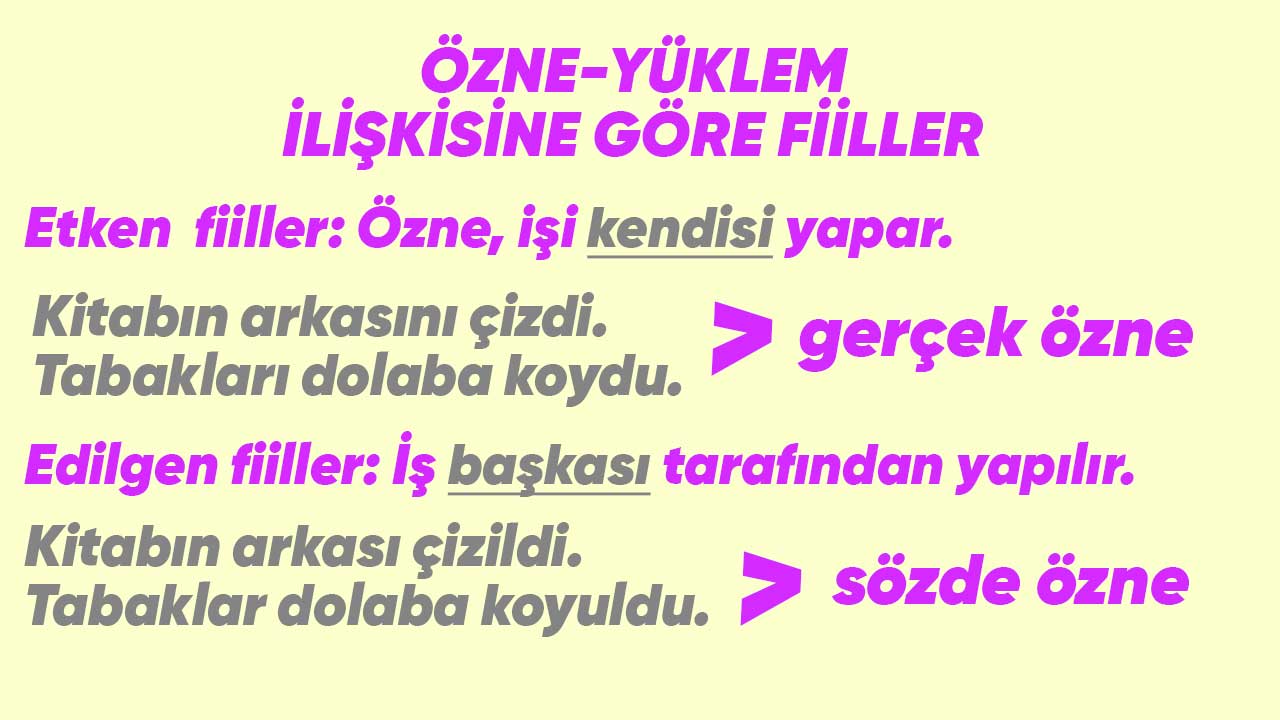
Example of active verbs:
The subject does the work itself, and in sentences the subject is real.
- He drew the back of the book.
- He put the plates in the cupboard.
Example of passive verbs:
The work is done by someone else and the subject is in the word.
- The back of the book was scratched.
- The plates were put in the cupboard.
Another detail you will encounter. Be careful!
In some active verbs, the action “opposite” or “together” It means doing. The suffix “-ş” adds these meanings to the verb.
- We corresponded with the manager for the meeting.
- The children laughed at the cartoon.
Habitual verbs
intransitive verbs, “-t, -r, -tır” It can be made transitive with suffixes. This type of verb is fatal.
- cried (intransitive)
- Made me cry (transitive)
- Dinner is cooked (intransitive)
- He cooked (transitive)
causative verbs
Causative verb, transitive verb root, “-t, -r, -tır” one or two of the suffixes coming Increasing the degree of transitivity.
- My mother had the house cleaned.
- My mother had the house cleaned.
Verbs according to object-predicate relationship:
- Transitive verbs that can take objects
- Intransitive verbs that cannot take objects
- reflexive verbs
- analogous verbs
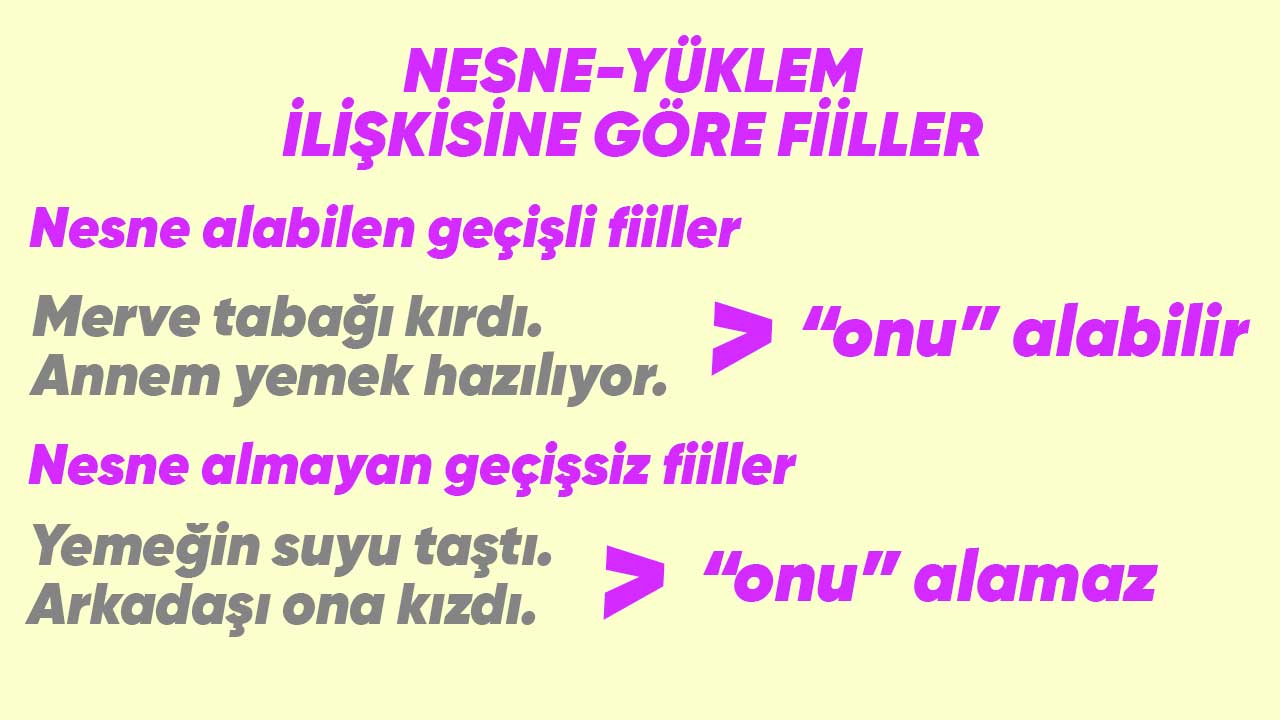
Example of transitive verbs:
Sentences can take the word “him”.
- Merve broke the plate.
- My mother is preparing dinner.
Example of intransitive verbs:
Sentences cannot contain the word “him”.
- His food and water overflowed.
- His friend got angry at him.
Watch out here!
In some sentences, even if there is no object, the predicate verb can be transitive. The word “him” can also be used in such verbs.
- Aunt Ayşe explained it very well.
- I sat and thought from morning to evening.
These two examples are transitive because the word “him” can appear in them.
reflexive verbs
Just like passive verbs, reflexive verbs also “-l, -n” It is created with suffixes. However, its difference from the passive is that the subject both performs the action and is affected by the action.
- When he was not successful, he withdrew from the competition.
- My friend left his workplace.
Passive and reflexive forms should not be confused because they are formed with the same suffixes. In passive verbs, the subject is the pseudo-subject. In reflexive verbs, it is the real subject.
analogous verbs
actualized “-s” If the action with the suffix is done mutually or together by at least two people “verb with voiced voice”is.
- They met his father at the door.
- They broke even with accounting at the end of the month.
- They looked at each other at the bar for a long time.
Attention: Even if there is a “-ş” suffix in the verb of some sentences may not be considered a cognate verb. The action must have a plural suffix or be carried out by a word that indicates a community.
- Butterflies flew. (it is not a verb)
- The entire class studied for weeks to pass the exam. (it is a verb)
Note: The words peace, wrestling, war and race are similar in terms of their roots. These words do not need suffixes.
“Erkan found his cat.” Let’s take the sentence and explain it with an example.
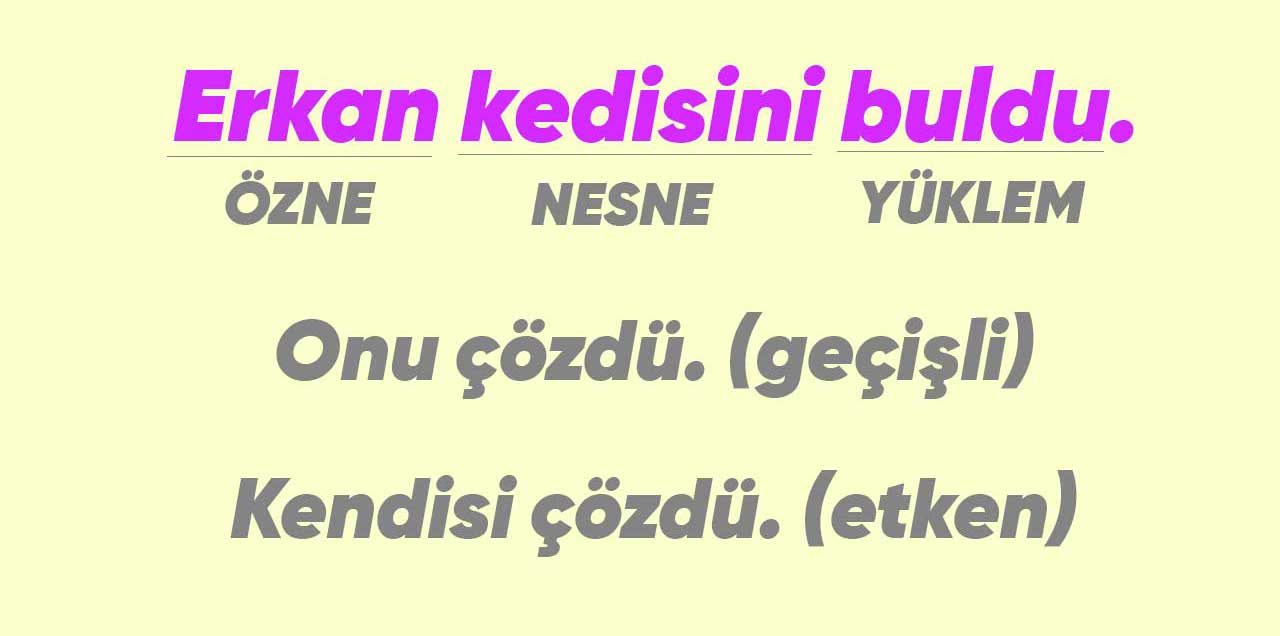
“Erkan” subject“cat” article and “found” is a predicate.
If there is a subject-predicate relationship, it is checked whether Erkan found it himself or whether the cat was found by someone else. Since Erkan found his cat himself, this verb is a factor.
In the object-predicate relationship, “What did Erkan find?” He found the cats. Because it can receive objects verb is transitive.
Let’s take a look at the questions and examples regarding the actual roof topic:
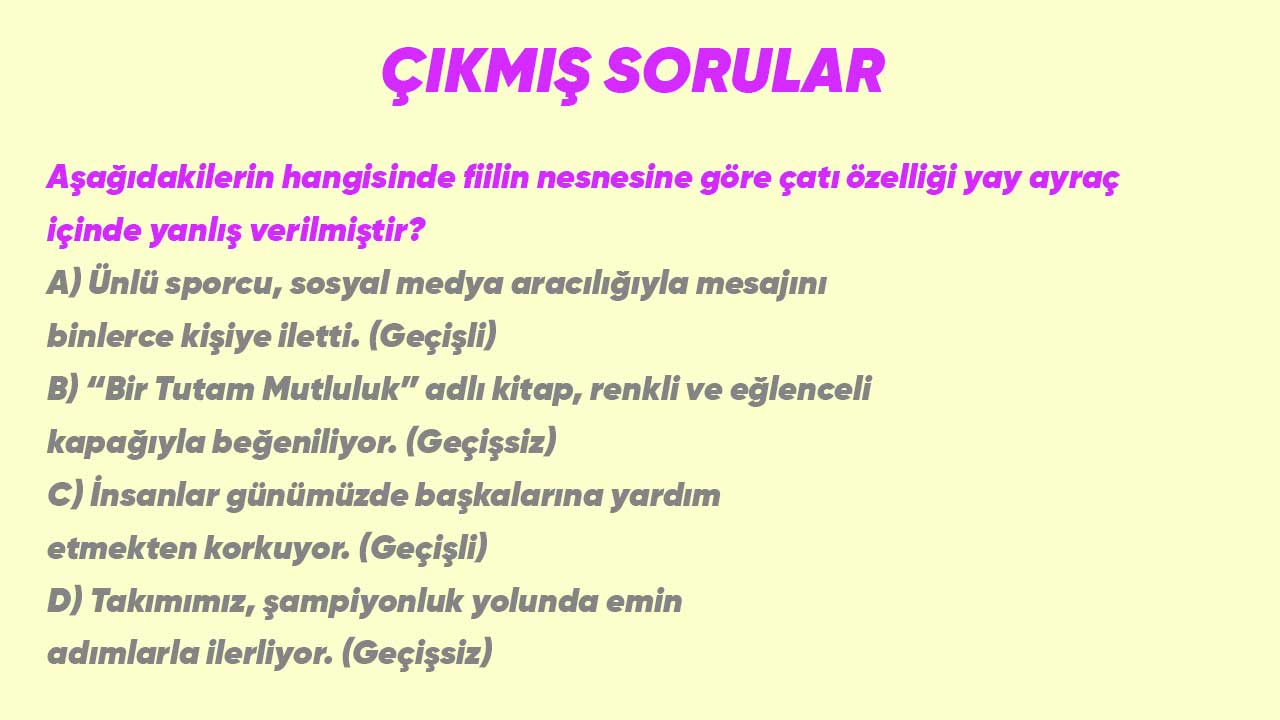
Answer: C
To find the answer to the question briefly, we can put the word “him” in each sentence.
- A) He conveyed it. (transitive)
- B) He is liked. (intransitive)
- C) It scares him. (As in option B, it should be intransitive, but it is written transitively. Therefore, our answer is C.)
- D) He is advancing it. (Intransitive)
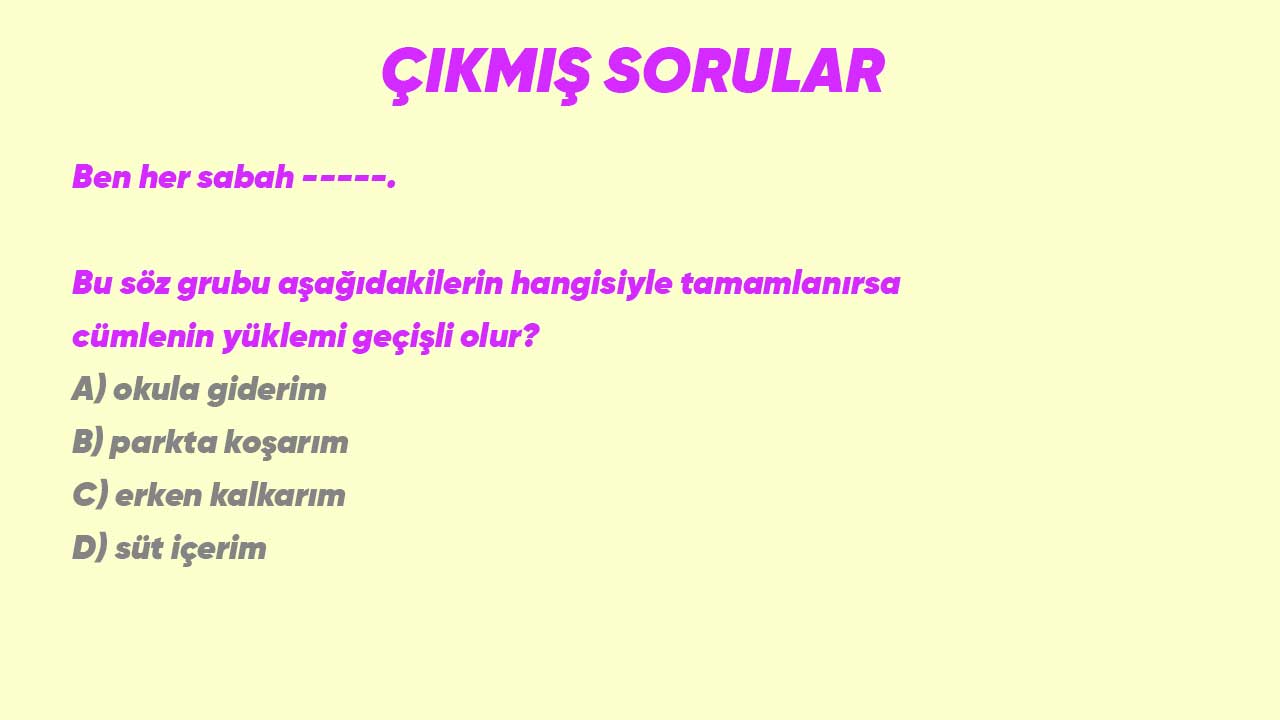
Answer: D
The word “him” is not added to the action in all other options. Therefore the correct answer is D.
”I drink milk every morning. I’ll drink it.”
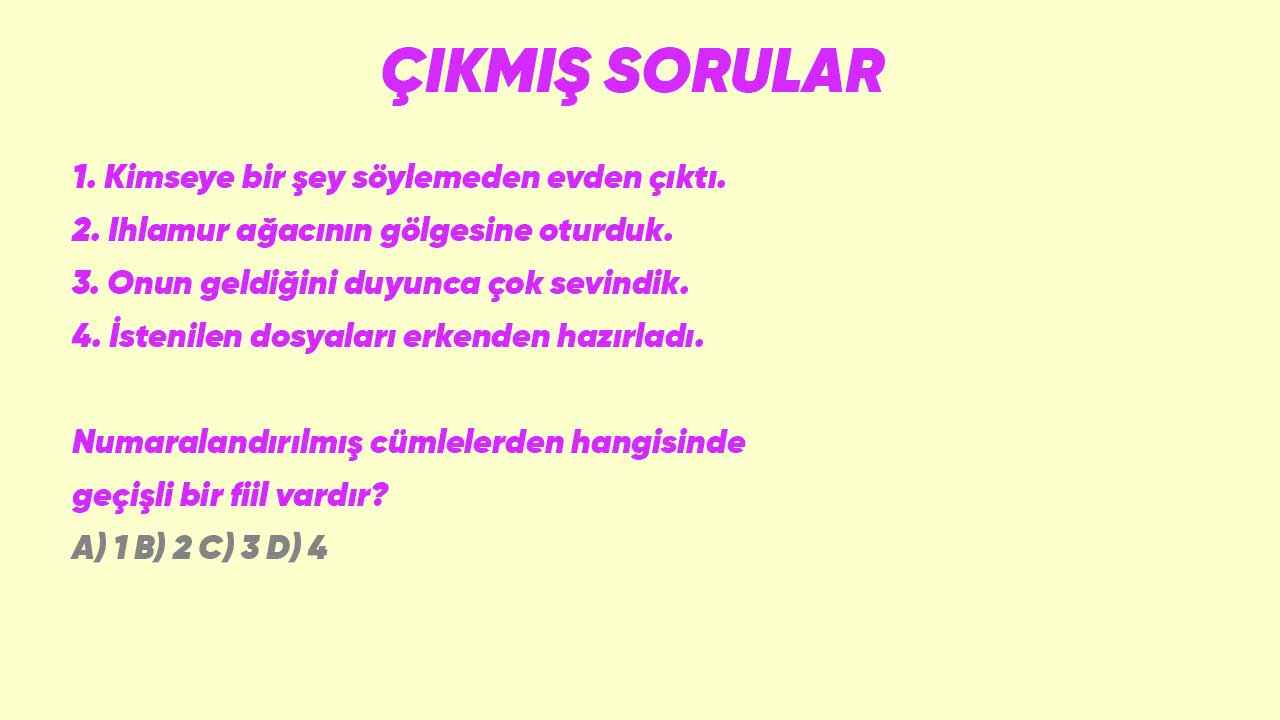
Answer: D
In our last question, loading is just enough to bring “it”. While other verbs are intransitive, there is a transitive verb in our 4th sentence.
After examining the examples, you need to practice a lot to understand the subject more clearly. in solving questions There is benefit.
If you indicate in the comments the subject that confuses you in Turkish and that you cannot keep in mind, the content we will include will be included. you can contribute.
RELATED NEWS
It’s Impossible to Get 20 out of 20 in This Test, Where Even Those Who Say “I’m Obsessed with Spelling Rules” Will Stumble!
RELATED NEWS
How Many Years Can You Do in This Spelling Test That Even Turkish Language Association Employees Cannot Complete?
RELATED NEWS
How Many Years Can You Do in This Spelling Test That Even Turkish Teachers Can’t Complete? (Part 2)
RELATED NEWS
